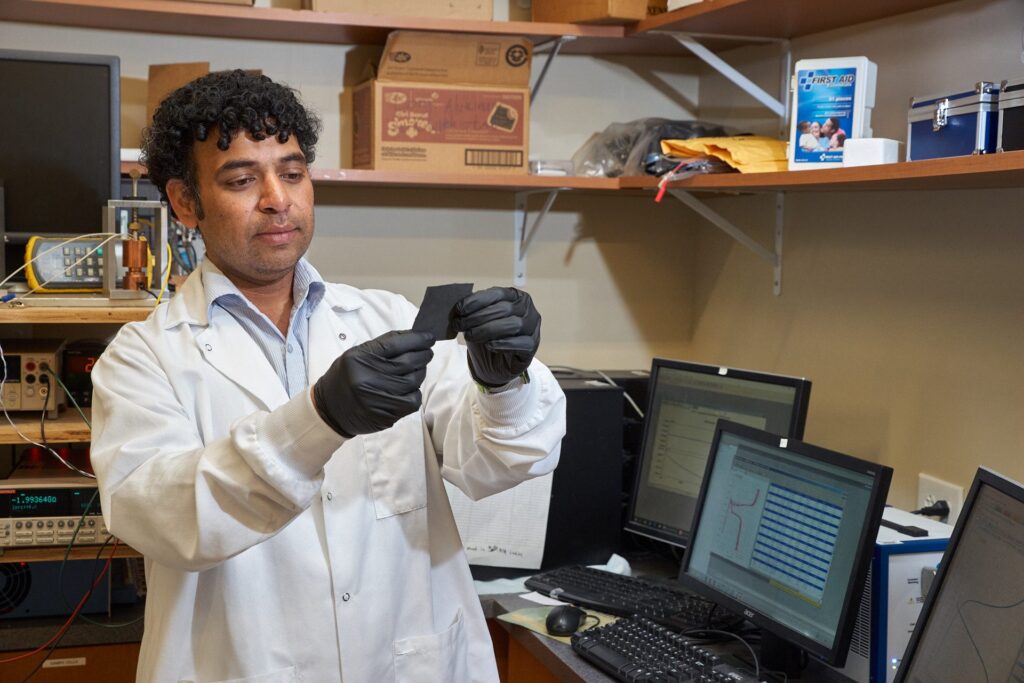
Ramakrishna Podila, a distinguished materials physicist at Clemson University, has been named a Fellow of the Institute of Physics, a prestigious professional society based in the United Kingdom and Ireland with a membership of approximately 21,000 scientists worldwide. Podila’s recognition comes as a testament to his significant contributions to modern condensed matter and applied physics.
“It’s an honor to be selected as a Fellow of the Institute of Physics. Having a panel of peer reviewers who you do not know and with whom you have not collaborated telling you that you are deserving, is humbling,” Podila expressed upon receiving the accolade.
Interdisciplinary Research and Innovations
Podila’s research is renowned for its interdisciplinary approach, bridging physics with chemistry, biology, and materials science. His work has primarily focused on energy conversion and storage, nano-bio interfaces, and photonics and bioimaging. These areas have led to groundbreaking discoveries in low-dimensional materials, impacting sectors such as energy, health, and photonics.
His pioneering efforts in nanoscience and nanobiophysics have advanced the development of next-generation supercapacitors and batteries, as well as ambient energy harvesting through triboelectric nanogenerator (TENG) research. “My group’s work has been very multidisciplinary. Physics is at its core, but we venture out into different areas, like energy, health, and optics. The boundaries between sciences are very blurred and not really relevant anymore,” Podila noted.
Pioneering Contributions and Future Directions
Podila’s belief in the transformative power of physics is evident in his research philosophy. “Look at any problems that have transformed the world, be it genetics or computing, all these revolutionary technologies, at the core, there was a physics person who picked up a non-physics problem and made a huge impact. The motto of our lab is from discovery to device,” he stated.
Currently, his research group is exploring the foundations of quantum mechanics and quantum biology, a field Podila believes could revolutionize our understanding of biological processes. “A lot of biology ignores quantum phenomena,” he explained. His team is investigating viral quasi species to uncover quantum effects in biological environments, a venture that could redefine evolutionary biology.
“Quantum biology, I think, is going to be the next big thing,” Podila said. “I hope it starts a new body of work in applying quantum to how viruses replicate and in general, that could have impact on how evolution happens. There are a lot of challenges in there. It’s still a nascent, emerging field. But that’s how it always starts, with one crazy paper. I’m hoping the paper we submitted will be the crazy paper that instigates a new area of work.”
Recognition and Academic Journey
Podila’s research has garnered support from prominent agencies such as the National Science Foundation, National Institutes of Health, NASA, and the U.S. Army, alongside numerous global corporations. He has authored over 100 scholarly publications, with some recognized among the top 1% of cited articles in materials chemistry by Web of Science. Additionally, he holds two U.S. patents.
Podila’s academic journey began with a master’s degree in physics from the Indian Institute of Technology at Roorkee in 2007, followed by a Ph.D. in condensed matter physics from Clemson University in 2011. After completing his doctorate, he served as a postdoctoral fellow in nanomedicine at Eastern Carolina University’s Brody School of Medicine before joining Clemson as an assistant professor in 2015. He was promoted to associate professor in 2020.
His accolades at Clemson include the Roaring10 Award from the Clemson Young Alumni Council in 2019 and the Rising Star in Discovery Award for the College of Science in 2021. Podila is also recognized as a Fellow of the Royal Society of Chemistry.
Implications and Future Prospects
Podila’s election as a Fellow of the Institute of Physics not only highlights his individual achievements but also underscores the potential of interdisciplinary research in addressing complex global challenges. As he continues to push the boundaries of physics, his work promises to inspire future innovations in science and technology.
Looking ahead, Podila’s focus on quantum biology could pave the way for new scientific breakthroughs, potentially altering our understanding of biological processes and evolutionary mechanisms. The scientific community will undoubtedly watch closely as his research unfolds, anticipating the next wave of discoveries that could emerge from his pioneering efforts.







